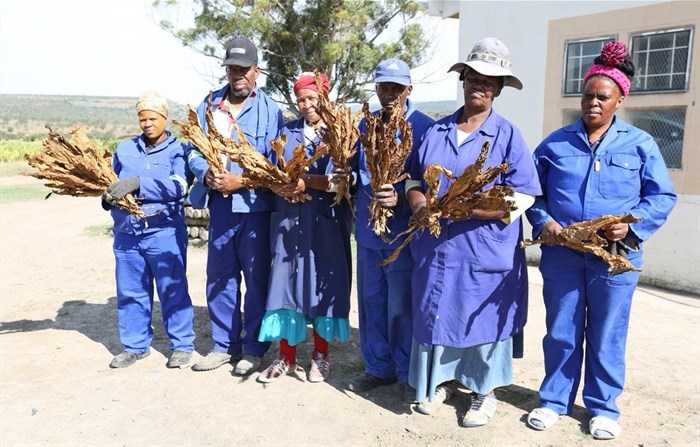
Top stories






More news







Logistics & Transport
Uganda plans new rail link to Tanzania for mineral export boost











Backed by British American Tobacco (BAT), the tobacco operation is owned by the five-member Khatala Community Project Development Cooperative.
The five-member Khatala Community Project Development Cooperative which has access to 52 hectares of land was selected to participate in the BAT Black Farmers Development Programme after the tobacco producer approached ECDC in 2016 to identify Black farmers with a potential for tobacco production.
"As part of the development programme, the farmers will plant tobacco and BAT will buy it. For every hectare of tobacco planted they assist the community to plant between three to five hectares of cash crops. Cash crops include maize, Lucerne, butternut, sugar beans and sweet potato. In the 1,2-hectare pilot, BAT assisted the co-operative to plant butternut, sugar beans and sweet potato. After the successful pilot, BAT expanded tobacco production at the site to 10 hectares in October 2018. Since March 2019 the co-operative has been harvesting tobacco on the 10ha.
A total of 37 people were employed on the 10 hectares. ECDC’s commitment to BAT is replicating the project to other communities should the Balfour pilot prove successful as it has.
"ECDC has since injected R500,000 into the co-operative through the Imvaba Cooperative Fund to buy a tractor with trailer, planter, reaper and a disc to assist with production. ECDC also brought in the local municipality to assist with infrastructure and bush-clearing. At the moment, the co-operative harvests the tobacco, and dries it between 20 to 25 days and delivers it to the BAT Rustenburg factory for further processing. BAT assists the co-operative with the logistics," says Simphiwe Ntshweni, ECDC Imvaba Cooperative Fund acting manager.
Ntsweni says BAT also works with the Limpopo tobacco producers which has established a fund for tobacco producers. From that fund, the cooperative has taken a production loan with each cooperative member standing surety. BAT also has a mentor on site every month to ensure production is unhindered.
He says before taking on the pilot, BAT carried out an assessment to determine if there was enough water for irrigation at the site, soil types and the suitability of the weather as tobacco is sensitive to wind.
"In future, the plan is to have a processing plant on site. However, the requirement is to have at least 100 hectares of tobacco within a 50km radius to justify a processing plant. ECDC plans to take this to the provincial government to support tobacco production to justify the establishment of a processing plant," explains Ntshweni.
Ntshweni says ECDC is looking at supporting employment creation and value on behalf of communities where there is an investment. Three jobs are created for a period of 12 months in each hectare of tobacco. However, in this cooperative employees agreed on sharing the wages among 15 unemployed residents, resulting in 15 people being employed per hectare.